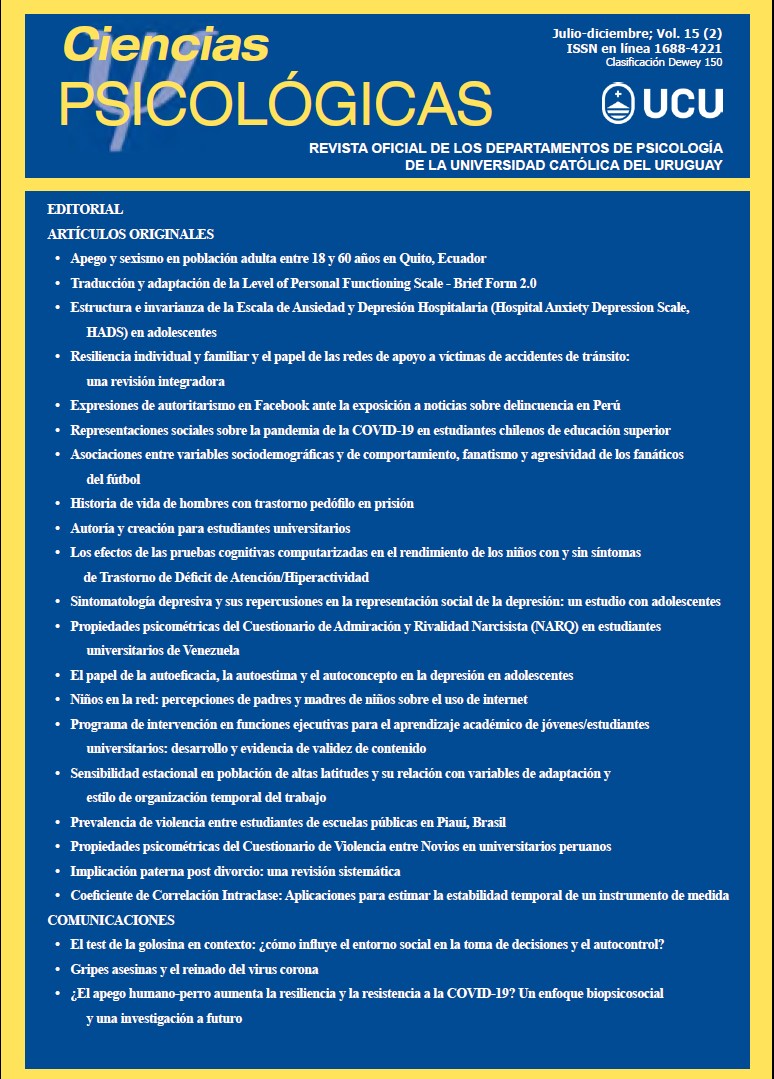O teste do marshmallow em contexto: como o ambiente social influencia a tomada de decisões e o autocontrole?
DOI:
https://doi.org/10.22235/cp.v15i2.2486Palavras-chave:
tomada de decisão, teste do marshmallow, autocontrole, adiamento de recompensas, contexto socialResumo
Este artigo propõe uma discussão sobre os fatores psicossociais que influenciam a maneira em que os seres humanos tomam decisões relacionadas ao autocontrole, enfatizando o que fazem as crianças pré-escolares em situações de adiamento de recompensa. Para isso, tomamos como ponto de partida o teste do marshmallow aplicado ao contexto social, para analisar a forma pela qual aspectos como a racionalidade, as emoções, a condição socioeconômica, e particularmente a confiança nos outros influenciam em como as decisões são tomadas e como se exerce ou não o autocontrole em relação ao adiamento de recompensas imediatas para obter, posteriormente, outras maiores.
Downloads
Referências
Ariely, D. (2010). Predictably irrational: The hidden forces that shape our decisions (Revisado y ampliado). Harper Perennial.
Brighton, H. & Todd, P. (2009). Situationg rationality: ecologically rational decision making with simple heuristics. En Robbins, P., & Aydede, M. (Eds.), The Cambridge Handbook of Situated Cognition (pp. 322-346). Cambridge: Cambridge University Press.
Chaverri, P., Conejo, D., León, S., & Arrieta, A. (2020). Postergación de la gratificación en preescolares costarricenses: efecto de la confianza en la persona experimentadora y del estrato socioeconómico. Artículo en revisión.
Damasio, A. R. (1994). Descartes’ error: Emotion, reason, and the human brain. Putnam.
Damasio, A. (2018). El extraño orden de las cosas: La vida, los sentimientos y la creación de las culturas. Ediciones Destino.
Eagleman, D. (2017). The brain: The story of you. Vintage Penguin Random House.
Fehr, E. (2009). Social Preferences and the Brain. En P. W. Glimcher, C. F. Camerer, E. Fehr, & R. A. Poldrack (Eds.), Neuroeconomics (pp. 215-232). Academic Press. doi: https://doi.org/10.1016/B978-0-12-374176-9.00015-4
Güth, W., Schmittberger, R., & Schwarze, B. (1982). An experimental analysis of ultimatum bargaining. Journal of Economic Behavior & Organization, 3(4), 367-388. doi: https://doi.org/10.1016/0167-2681(82)90011-7
Jensen, K., Call, J., & Tomasello, M. (2007). Chimpanzees Are Rational Maximizers in an Ultimatum Game. Science, 318(5847), 107-109. doi: https://doi.org/10.1126/science.1145850
Kahneman, D. (2011). Thinking, fast and slow (1° ed.). Farrar, Straus and Giroux.
Kidd, C., Palmeri, H., & Aslin, R. N. (2013). Rational snacking: Young children’s decision-making on the marshmallow task is moderated by beliefs about environmental reliability. Cognition, 126(1), 109-114. doi: https://doi.org/10.1016/j.cognition.2012.08.004
Lamm, B., Keller, H., Teiser, J., Yovsi, R., Suhrke, J., Vohringer, I., Knopf, M., Lohaus, A., Gudi, H., Freitag, C., Fassbender, I., Teubert, M. & Schwarzer, G. (2018). Waiting for the Second Treat: Developing Culture-Specific Modes of Self-Regulation. Child Development, 89(3), e261-e277. doi: https://doi.org/10.1111/cdev.12847
Michaelson, L. E., & Munakata, Y. (2016). Trust matters: Seeing how an adult treats another person influences preschoolers’ willingness to delay gratification. Developmental Science, 19(6), 1011-1019. doi: https://doi.org/10.1111/desc.12388
Mischel, W. (2014). The marshmallow test: Mastering self-control. Little, Brown and Company.
Mischel, W., & Staub, E. (1965). Effects of expectancy on working and waiting for larger rewards. Journal of Personality and Social Psychology, 2, 625-633. doi: https://doi.org/10.1037/h0022677
Robbins, P., & Aydede, M. (Eds.). (2009). The Cambridge handbook of situated cognition. Cambridge University Press.
Sanfey, A. G., Rilling, J. K., Aronson, J. A., Nystrom, L. E., & Cohen, J. D. (2003). The Neural Basis of Economic Decision-Making in the Ultimatum Game. Science, 300(5626), 1755-1758. doi: https://doi.org/10.1126/science.1082976
Siegel, D. J. (2016). Guía de neurobiología interpersonal: Un manual integrativo de la mente. Eleftheria.
Shah, A. K., Mullainathan, S., & Shafir, E. (2012). Some consequences of having too little. Science, 338(6107), 682-685. doi: https://doi.org/10.1126/science.1222426
Shoda, Y., Mischel, W., & Peake, P. K. (1990). Predicting adolescent cognitive and social competence from preschool delay of gratification: Identifying diagnostic conditions. Developmental Psychology, 26, 978-986. doi: https://doi.org/10.1037/0012-1649.26.6.978
Slovic, P. (1990). Choice. En: D. Osherson, E. Smith (Eds.). An invitation to cognitive science: Vol. 3. Thinking (pp. 89-116). MIT Press.
Smith, E. E. & Kosslyn, S. M. (2012). Procesos cognitivos: Modelos y bases neuronales. Pearson Prentice Hall.
Sternberg, R. J., Espinosa Rodríguez, J., Ortíz Salinas, M. E., & Reyes Ponce, L. (2011). Psicología Cognoscitiva. Cengage Learning.
Thagard, P. (2019). Mind-society: From brains to social sciences and professions. Oxford University Press. doi: https://doi.org/10.1093/oso/9780190678722.001.0001
Todd, P. M., & Gigerenzer, G. (Eds.). (2012). Ecological rationality: Intelligence in the world. Oxford University Press. doi: https://doi.org/10.1093/acprof:oso/9780195315448.001.0001
Watts, T. W., Duncan, G. J., & Quan, H. (2018). Revisiting the Marshmallow Test: A Conceptual Replication Investigating Links Between Early Delay of Gratification and Later Outcomes. Psychological Science, 29(7), 1159-1177. doi: https://doi.org/10.1177/0956797618761661
Downloads
Publicado
Como Citar
Edição
Secção
Licença
Direitos de Autor (c) 2021 Universidad Católica del Uruguay

Este trabalho encontra-se publicado com a Licença Internacional Creative Commons Atribuição 4.0.
















